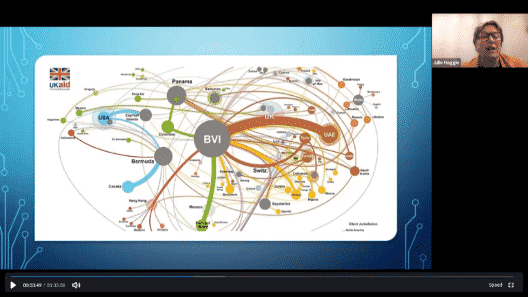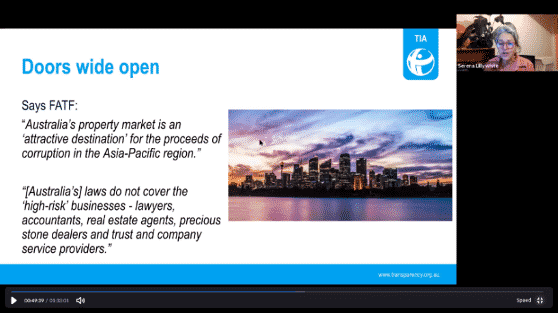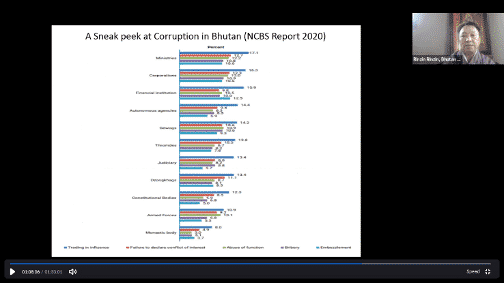2 July 2021-
The Coalition’s second regional meeting of the Asia-Pacific group took place on 23 June, featuring discussions on a variety of topics with relevance to the region. 15 representatives from all over the region, Asia-Pacific representatives of the Coalition Coordination Committee (CCC), and colleagues from the Coalition’s Vienna-Hub participated in the event.
The Regional Coordinator for Asia-Pacific Fatema Afroz set the scene for presentations and discussion on the main agenda items of the meeting: the UNGASS, Money Laundering, and Private Sector Corruption.
The UNGASS against Corruption: main outcomes
Yonatan Yakir from the Vienna Hub made a brief presentation on the outcomes of the first-ever UN General Assembly Special Session against Corruption (the UNGASS). The main message coming out of this high-level meeting is that the international community as a whole and the Member States individually should push for stronger implementation of the UNCAC, and not enter into negotiations of new multilateral agreements. Unfortunately, the heavily caveated UNGASS Political Declaration seems to be neither bold nor forward-looking to contain clear commitments for reforms and actions against corruption. However, it does address some crucial aspects such as the need to promote safe civic space, transparency in public procurement, beneficial ownership transparency, better access to information regulations, and protection of whistleblowers. It also sets 2030 as the deadline for criminalizing forms of bribery, as required by the UNCAC itself. During the General Debate, at least 45 Member States highlighted the importance of including civil society in the fight against corruption. CSOs are encouraged to “fact-check” the national statements and follow up on any commitments made by the country representatives. The recording of the national statements could be found here.
The UNGASS also featured numerous important side events, some hosted and organized by UNCAC Coalition member CSOs.
Connecting this presentation to the other topics of this regional meeting, Yakir discussed paragraphs of the political declaration that address private sector corruption, as well as follow-up actions already taken, such as the unifying framework for gatekeepers against IFFs. He concluded by emphasizing that the UNGASS political declaration is now considered the latest global consensus on anti-corruption, therefore the Member States are expected to take action to operationalize this document, and at the same time, civil society should hold governments accountable to the commitments made therein.
Corruption and money laundering in the Pacific: a new research
TI New Zealand (TI NZ) aims to reduce corruption risks in the Pacific region including by conducting research, monitoring, and advocacy on money laundering and illicit financial flows coming in and out of Pacific countries. Chief Executive Officer Julie Haggie presented TI NZ’s upcoming effort to research corruption and money laundering in the Pacific region in the context of economic globalization and the use of information and communication technologies.

The amount and nature of illicit flow of funds, and the nature of corrupt practices have been the subject of past research, but the reciprocal and facilitating reinforcement of each to the other is not well researched in the Pacific context. The study will refer to the findings of the Panama Papers, Paradise Papers, and the Global Consortium of Investigative Journalists. This is an attempt to map and assess the vulnerabilities of Pacific Nations and the economic and political risks they face from the nexus of corruption and money laundering and to discuss the existence and effectiveness of the legal and policy mechanisms that are supposed to ensure that the corporate, social-cultural and financial systems of nations in the Pacific region are not abused. The research is expected to be completed by the end of 2021.
Money laundering in Australia
Serena Lillywhite, Chief Executive Officer of Transparency International Australia (TIA) discussed the nature of the fight against money laundering in Australia and her country’s dubious reputation in this regard. Australia is considered a major destination for ‘dirty money, stemming also from countries in the region such as Papua New Guinea, Malaysia, China, and Cambodia. Australia’s Anti-money laundering laws are ineffective in addressing the non-financial businesses and professions in this sector are not required to report suspicious transactions. With 31 different corporate registers, the system is considered to be messy and flawed making it all too easy to register companies that could serve as vehicles for money laundering. As ML is increasingly receiving the spotlight in Australia, TIA is in the process of developing a new global strategy focusing on holding power to account for the common good and among other activities is advocating for strengthening laws on AML.

Private sector corruption in Bhutan: main causes & prevention
Rinzin Rinzin, Executive Director of one of the Coalition’s new members, Bhutan Transparency Initiative (BTI), delivered a presentation on the issue of corruption in the private sector of Bhutan. Bhutan has a very low rate of crime and corruption is perceived as less prevalent according to world rankings, including the CPI. He described Bhutan’s small and closely knit society with its citizens having a high regard for public service. On the other hand, corruption is also highest in the public sector which in turn induces corruption in the private sector. Private sector corruption is routed in nepotism and favoritism which are characteristic of small societies such as Bhutan’s. Moreover, leniencies and indifference to corruption also exist. Mr. Rinzin brought up recommendations to reduce private sector corruption in Bhutan such as through the creation of integrity pacts, proper record keeping, and the need to introduce the use of information technology. The presentation ended on a positive note highlighting Bhutan’s national campaign towards a corruption resilient society that involves citizen engagement and the promotion of social accountability, and related tools such as a Whistle-Blower Protection Act.
Next steps
Participants agreed on the importance of sharing practices on the issues discussed, as well as on the benefits of sharing updates on developments in the global anti-corruption agenda and regional progress in this regard.
The next regional meeting will take place in September, which will be halfway between the UNGASS and the upcoming UNCAC Conference of States Parties (UNCAC CoSP) taking place in December in Egypt. This moment in time could serve as an opportunity to take stock of the commitments made in the Special Session and to discuss civil society advocacy in the run-up to the UNCAC CoSP that could promote stronger action, including by countries in the Asia-Pacific, to fulfill these commitments and to highlight further issues that are on the agenda of civil society groups in the region.
The meeting ended by encouraging the CSOs in the region to enhance the exchange of knowledge and experiences on key issues of corruption in the Asia-Pacific region.
If you are an anti-corruption activist or you represent a CSO from the Asia-Pacific Region and would like to get involved in the work of the UNCAC Coalition, please contact our Regional Coordinator Fatema Afroz at email hidden; JavaScript is required.




